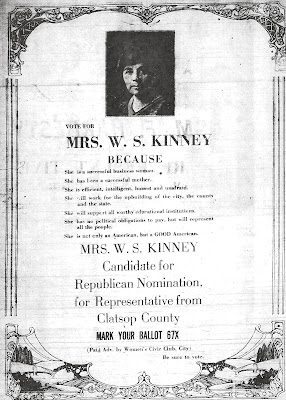More news from Astoria's microfilmed newspapers on women's political participation.
In October, 1914 Mary (Mrs. Gabriel) Wingate wrote an article outlining the goals of the Civic Club of Astoria. She emphasized the importance of women using their newly-won civic power of the vote.
Wingate told her readers that the members of the Civic Club were interested in all forms of community betterment and the group was "wishful to have every woman who is a resident of our city and interested in its welfare to join with us and it should be a heartfelt duty with every woman to help along these lines." Like many other recently-enfranchised women in the state, Wingate emphasized that women had a civic obligation to put their votes to good use. Members saw the Civic Club as an institution to harness that duty for collective action.
Like Portland activist Sarah Evans, Wingate contrasted women's limited "influence" before they held the right to vote with the power they now wielded with the ballot. "A few years ago we had a prosperous women's club in this city," she wrote, "with a large and enthusiastic membership who were zealous to aid in all matters that would better social and business conditions." But the women learned, she said, that "any suggestions for improvement of our city, made to the powers that be, were never seriously considered by them."
The right to vote changed that, Wingate insisted. "Now that women have the vote, and a voice in affairs, conditions in that regard are radically different, and any suggestions or recommendations we may make will, no doubt, be given careful and serious consideration." Optimistic about this new power, Wingate noted that the Civic Club was an "outgrowth" of the women's club and urged Astoria's women to register to vote and to exercise their right to have a voice in community affairs.
"The Civic Club," Astoria Daily Budget, October 12, 1914, 7.
Mary Wingate and other Astoria women were part of a larger pattern when they formed civic clubs to study legislation and civic education. "It is natural for women to be interested in the governing of their city, county, and state," she wrote, "and they should all cultivate civic pride and patriotism." Wingate was not alone in her view that women could make a significant difference in their new civic roles. Oregon women achieved the vote earlier than most women in the nation but the transformation of the National American Woman Suffrage Association to the National League of Women Voters in 1920 mirrors the activities and organizations of women in Astoria and across Oregon in their local organizations after achieving suffrage in 1912.







